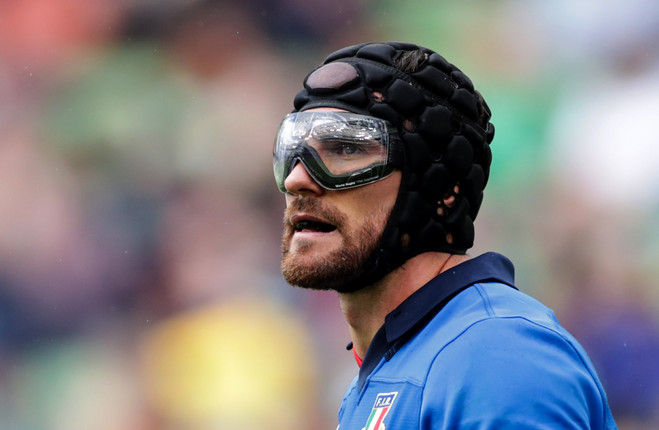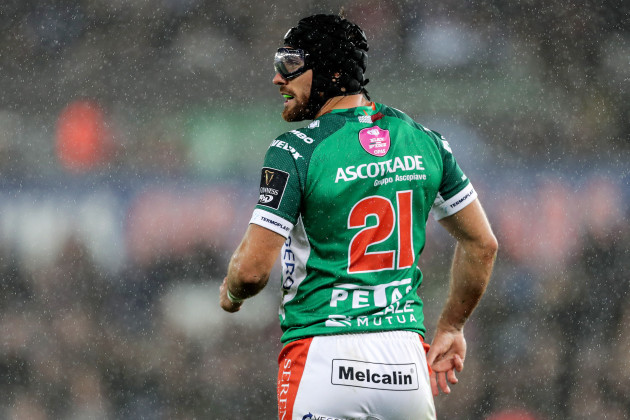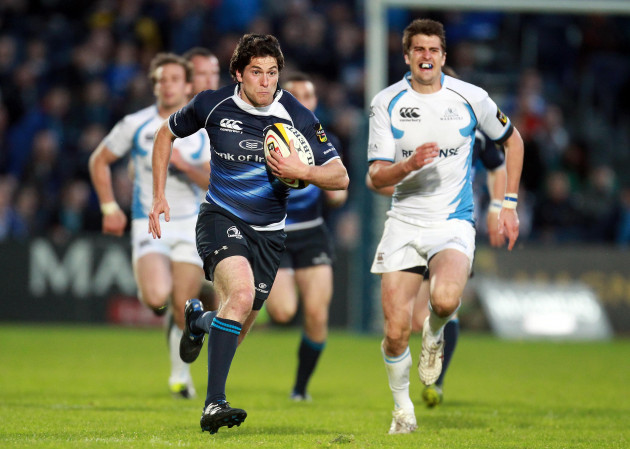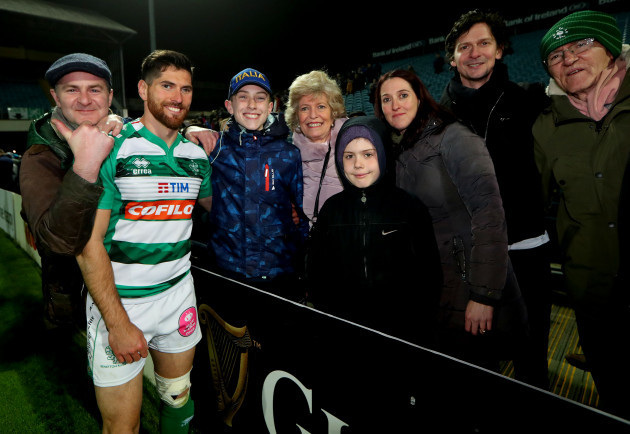IT WAS THE morning after he’d lost his eye. It was the beginning of a nervous day for Ian McKinley. His eye was itching, as if there was mud in it.
A patch covered the sore spot. He was in a ward with six beds, surrounded by his parents and the woman who he would become his wife. Yet it was the words of a man he’d never met before which stayed with McKinley for the rest of that day.
Dr Power was an eye specialist. He spoke to his patient in precise, simple terms, told him he had an eight millimetre gash at the top of his eyeball which needed to be stitched up.
He described it as a strange injury, then waited for questions. And only one came.
“When can I get back playing rugby?” McKinley asked.
There and then, Mr Power must have thought never. Anyone else would have. And that’s what makes the Ian McKinley story so different to every other rugby story you have ever read. For it’s not about rugby as much as it is about heartache and hope, about never giving up, about continuing to believe in a dawn when all you have is darkness.
We all know by now how this story ends, with McKinley coming back to the sport he loves, becoming an international with Italy, able to play again because of a special pair of goggles and a rule change that allowed him wear them.
“In line with that, there is a family element to my story,” he tells you. “To be a rugby player you need to have good gifts, a good attitude, but you also need a bit of luck along the way. The injury, yes, that was unfortunate but I consider myself a lucky man because of the people around me. You lose an eye, that’s devastating. That’s where friendships count, where family counts. That’s why I think I’m lucky.”
There were years when he didn’t have that perspective, when the loss of an eye equated to the loss of a career.
He’d been in the Millennium Stadium in 2011, as Leinster won their second Heineken Cup, and while he may not have been considered good enough to make the bench, he was relevant enough to be given access onto the pitch for the celebrations.
Suddenly that was all taken away from him.
“There was a certain loss of identity,” McKinley says, “because as a young kid, I wasn’t the academic kind. From six, seven years old, people knew me as the sporty kid. So when that is all of a sudden taken away, your identity is gone. I wanted that back.”
It took three years and the invention of a special pair of goggles for him to get that back. But even then, there were challenges, the trouble seeing through the goggles on foggy days, humid days, in night games, on any afternoon or evening when the mud splattered onto his visors.
Had Ian McKinley said enough is enough, that this dream was futile, everyone would have understood. Yet he stuck at it, working his way up from lower league amateur rugby in Italy to their international team. “As my career went on, you’d always ask ‘why are you doing this?’ One reason was obvious: I loved it.
“But the second reason was that I had arrived into this visually impaired world, this mixed ability world. That led to me getting messages of support. They were the ones you were playing for. So the times when it was difficult, the times when you’d drop a ball you’d normally catch, that was when you returned to the bigger thing.
“You wanted to inspire people who were in difficulty like yourself.”
McKinley writes about this journey through trauma, sight loss and international rugby in his recently published autobiography, Second Sight, an eloquent account of one of sport’s greatest comeback stories.
Before McKinley had his accident, when a team-mate’s boot unintentionally landed in his eye at the bottom of a ruck, he was considered the coming man, a player of such talent that he was being spoken about in the same breath as another young Leinster out half called Johnny Sexton.
Post-accident his life went into a bit of a slump.
Aside from the loss of sight and loss of identity, there was also a loss of happiness. He couldn’t watch rugby games; couldn’t bring himself to appraise each delicate touch from a rival No10, to appreciate the mastery of an out-half’s kicks, their awareness of space, their deep intelligence to know when it was time to run and when to pass.
Almost every prideful male needs some kind of outlet. For McKinley it was coaching but he wasn’t himself there. He was too young to be an educator when he still had so much to learn.
And then one day he read about these goggles that had been invented and everything changed. He was able to play again, to feel his lungs burn after a run, his calf ache from a game, his arms bruise from a tackle. He was operating at one of the lowest rungs of Italian rugby, yet those first weeks back playing were some of the highlights of his life.
“I was just as happy then, if not even more happy, than when I was in the Millennium Stadium with Leinster that time,” he says.
Gradually he climbed the ladder, first to Zebre, then Treviso, then to Italy. An international outhalf playing under the tricolour, not the flag he grew up supporting, but one he was proud to represent. Another community, though, crossed borders. The group of visually impaired people from around the world who saw Ian McKinley as the role model they needed to keep on keeping on.
“If things went wrong you never made the goggles an excuse because if you did, you’d never be picked for a team again,” says McKinley.
“I knew it was tough for coaches because picking a half-blind, goggle-wearing out-half is never the easiest thing. You had to try and make sure your standards and stats were as good, if not better than everyone else.”
Gradually he came to learn how life was better for him than almost everyone else. You tend to get this level of appreciation from Irish players who live abroad. These groups of athletes don’t ‘stick to the process’.
Their ‘learnings’ involve a new language, a different culture. The Irish rugby player who goes abroad tends to be more thoughtful and adventurous than the ones who never stray beyond the garden gate.
This particular Irishman abroad fell in love with the sights and sounds of an Italian afternoon, the cries of food vendors, the voices of university students walking along the cobblestone streets, the echoes of church bells that rang every hour.
“I was very determined when I started back playing that I wanted to represent Italy,” McKinley says, and it wasn’t as a career move, it wasn’t just out of pride, it was because of what Italy had given him, a second chance.
“I experienced two different rugby worlds in Italy, working full-time in the nine to five world with the rugby being the part-time element to it. Then being fully professional again.
“And I loved it.
“But look, there was also stress, because I didn’t want to mess up and hear people say, it’s because of the goggles. At international level, there’s a mental strain, a pressure. It’s hard to explain.”
As he speaks, he breaks away from the conversation to think about Sexton, his old rival, still a good friend. That strain, that pressure, Sexton has lived with that since 2009.
“He just seems to be getting better with each year which is incredible really; he’s immensely driven to get to where he wants; there’s not one thing with Johnny. There is the consistency in how you train, how you play at that elite level. I didn’t have the longevity that Johnny had; but whenever you are at international level, it’s just a different pace to everything.
“For him to have lasted so long at that level and still be able to compete is really extraordinary. Look at other players at the same age; I take my hat off to anyone. Sergio Parisse still going with Toulon, he’s late 30s, it takes serious commitment.”
McKinley’s rugby CV doesn’t run to as many pages as Sexton’s or Parisse’s, yet he has achieved something greater than anything you can ever get on a pitch. “Considering what has happened my greatest gift is that I am totally at peace both with watching a training session and retiring,” he writes in his book.
He further explains: “I am just so grateful to my brother for giving me that peace. If that hadn’t have happened I would be a lot snappier around people.
“Retirement is difficult – even this one, my second retirement because I miss training, I miss playing. I wanted to stop on my own terms at the highest level I could. And I did that. I’m grateful.
“But what I am most grateful now for is the fact I have no resentment with guys in my age category who have enjoyed great careers. Previously, after my first retirement, I would have had that. That is not a good way to be. That is not the case anymore.”
He’s never lost sight of that.
- Second Sight written by Ian McKinley with Gerry Thornley and published by Reach Sport is available in all good bookshops. See www.reachsport.com




